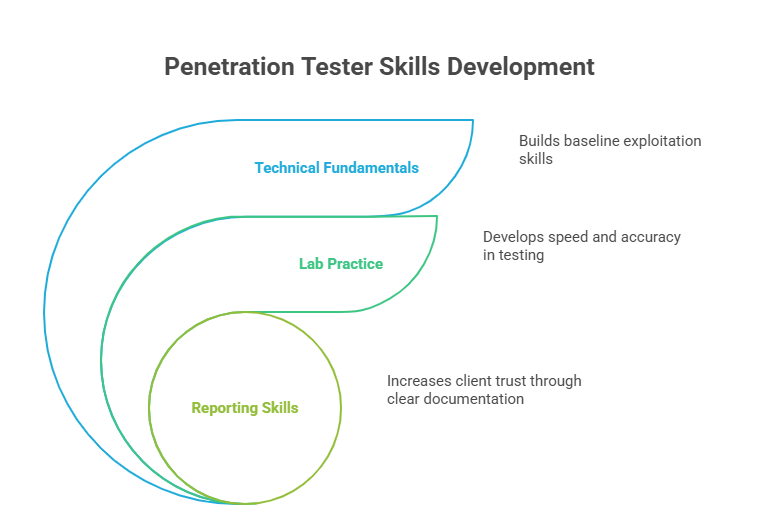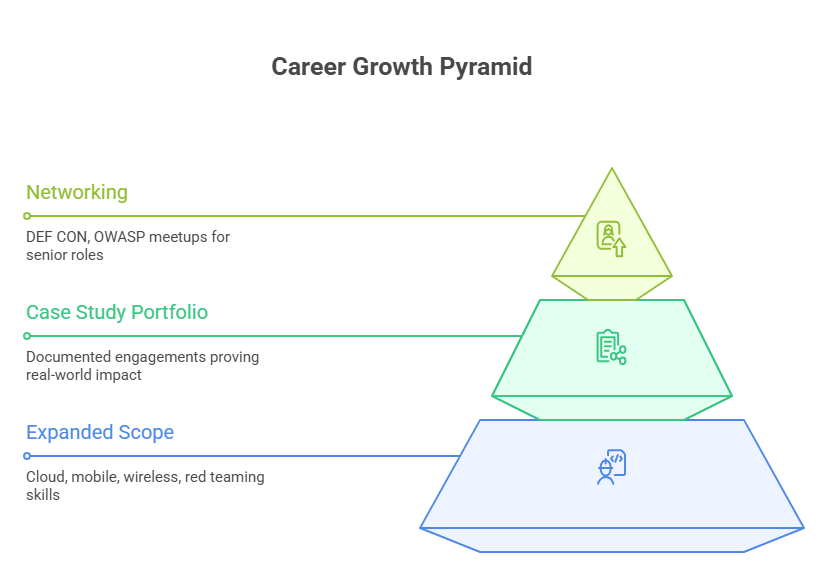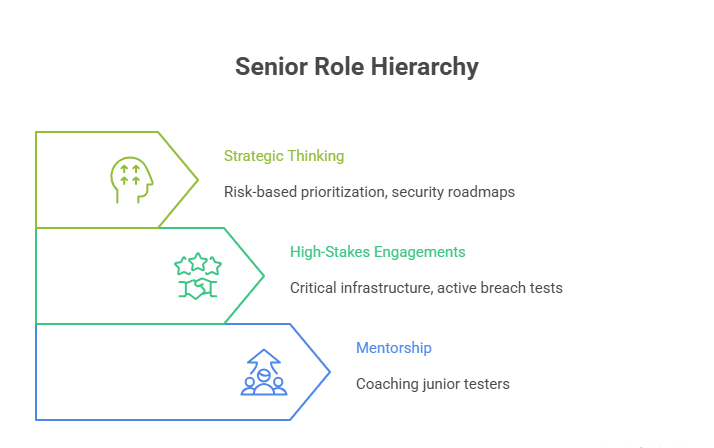Career Path: Junior Penetration Tester to Senior Consultant
Breaking into cybersecurity as a Junior Penetration Tester offers one of the most direct routes to mastering offensive security. In this role, you’ll work with tools and methodologies that simulate real-world attacks, uncovering vulnerabilities before malicious actors exploit them. It’s a position that demands sharp technical skills, adaptability, and a willingness to learn under pressure. Early career moves in penetration testing set the stage for high-impact work and a clear path toward senior consulting roles.
The transition from hands-on testing to becoming a Senior Security Consultant is more than a promotion — it’s a shift into strategy, client advisory, and complex project leadership. This guide maps out the exact skills, milestones, and certifications needed at each stage, while highlighting salary expectations and key growth accelerators like the Advanced Cybersecurity & Management Certification (ACSMC). Whether you’re starting fresh or aiming for career acceleration, this roadmap will help you move with purpose and precision toward top-tier cybersecurity consulting.
Starting Out as a Junior Penetration Tester
Skills to Develop in the First Year
Your first year as a Junior Penetration Tester should be focused on mastering technical fundamentals and building speed without sacrificing accuracy. Proficiency in vulnerability scanning, exploitation frameworks like Metasploit, and manual testing techniques is essential. Learn how to identify and chain vulnerabilities rather than relying solely on automated tools.
Familiarity with web application vulnerabilities (OWASP Top 10), network security flaws, and basic scripting in Python or Bash will help you adapt to diverse testing scenarios. Hands-on lab work is critical — platforms like Hack The Box and TryHackMe provide realistic practice environments. Additionally, sharpen your documentation skills. Clear, concise reporting that communicates risk in business terms is one of the fastest ways to stand out to senior consultants and clients.
Common Challenges for Beginners
Beginners often face the challenge of tool over-reliance — relying too heavily on scanners without understanding the underlying vulnerabilities. This limits your ability to handle novel or evasive attack scenarios. Another hurdle is time management during assessments; without structure, you risk incomplete coverage or superficial testing.
Client communication can also be intimidating at first. Translating highly technical findings into actionable business recommendations requires practice and empathy. Finally, junior testers often underestimate the importance of post-engagement learning. Reviewing your own work, understanding missed vulnerabilities, and incorporating feedback from senior team members accelerates your growth more than any certification alone.
Gaining Mid-Level Expertise
Expanding Scope Beyond Web App Testing
By the time you reach mid-level penetration testing, your focus should move beyond web application assessments into broader, more complex environments. This includes network infrastructure testing, wireless security assessments, mobile application penetration testing, and even cloud security reviews. The ability to pivot between multiple testing domains not only increases your market value but also prepares you for senior-level consulting.
You should also integrate red teaming and social engineering into your skillset. These engagements simulate multi-vector attacks, testing an organization’s detection and response capabilities. Diversifying your technical exposure ensures you can handle high-stakes projects with minimal supervision and greater strategic input.
Building a Portfolio of Case Studies
A portfolio of documented case studies is one of the most valuable assets at this stage. Each case study should outline the engagement type, scope, tools used, vulnerabilities discovered, and business impact of your recommendations. Redacting sensitive client information while retaining technical depth ensures you can showcase your capabilities without breaching confidentiality.
Case studies can be used during interviews, client meetings, and even conference talks to demonstrate proven results. They also help solidify your understanding of complex engagements, as documenting your process forces clarity and precision in both your technical and strategic thinking.
Networking for Career Growth
Networking remains a critical growth accelerator in penetration testing. Attending industry conferences like DEF CON, Black Hat, or local OWASP chapter meetings exposes you to emerging tools, methodologies, and hiring opportunities. Actively participating in security forums, LinkedIn groups, and CTF (Capture The Flag) competitions increases your visibility and credibility among peers and recruiters. Even a single strong professional connection can lead to high-value project referrals or senior consulting opportunities.
Transitioning into Senior Roles
Strategic Thinking and Client Advisory Skills
The jump to Senior Security Consultant requires a shift from purely technical execution to strategic oversight. You must be able to assess an organization’s entire security posture, prioritize risks based on business impact, and guide leadership on security investments. This involves developing risk assessment frameworks, aligning testing outcomes with compliance requirements, and advising on long-term remediation strategies rather than quick fixes.
Client advisory skills also mean tailoring communication to different audiences — executives expect clear, ROI-driven recommendations, while technical teams need precise, actionable steps. Mastering this dual communication style is critical to building trust and influencing decision-making at the highest levels.
Handling High-Stakes Security Engagements
Senior consultants frequently lead high-stakes engagements, such as testing critical infrastructure, conducting red team simulations for Fortune 500 companies, or responding to active breach scenarios. These projects require flawless planning, disciplined execution, and the ability to adapt tactics in real-time.
You’ll need to balance technical depth with project management, ensuring deliverables are met on schedule and meet contractual obligations. In many cases, senior consultants also act as incident response advisors, helping organizations recover quickly while strengthening their defenses for the future.
Mentorship and Team Leadership
Part of senior consulting is mentoring junior and mid-level testers. This involves more than just answering technical questions — it’s about instilling methodology, reviewing reports for clarity, and ensuring consistency in testing quality across the team.
Team leadership also extends to project coordination, assigning responsibilities based on strengths, and resolving technical or logistical roadblocks. The ability to lead effectively not only strengthens your team but also reinforces your standing as a trusted authority within the organization.
Salary Expectations Along the Career Path
Entry-Level Salary Ranges
A Junior Penetration Tester in the U.S. typically earns between $60,000 and $80,000 annually, with variations based on location, industry, and existing technical skills. Roles in finance, government contracting, and technology tend to pay at the higher end due to stringent compliance requirements and higher threat exposure.
Additional skills like scripting, cloud security testing, or familiarity with niche tools such as Burp Suite Pro or Cobalt Strike can push starting offers upward. While bonuses are less common at the junior stage, many employers offer certification sponsorships, lab access, and structured career progression, which add long-term value beyond the base salary.
Senior Consultant Earning Potential
A Senior Security Consultant can expect to earn between $120,000 and $160,000 annually, with elite consulting roles or high-risk engagements exceeding $180,000. This pay reflects the blend of technical mastery, project leadership, and client advisory responsibilities that senior consultants carry.
Specialization in high-demand niches — such as OT/ICS security, advanced red teaming, or cloud-native security architecture — can command premium rates. Independent consultants and contractors often surpass salaried earnings by billing $150–$300 per hour for specialized engagements, especially in industries with high compliance stakes. These compensation levels are attainable for professionals who combine deep technical skills with proven business impact.
| Career Stage | Average Salary (USD) | Notes |
|---|---|---|
| Junior Penetration Tester | $60,000 – $80,000 | Higher in finance, tech hubs, and government contracting |
| Mid-Level Penetration Tester | $85,000 – $110,000 | Includes leadership of small projects and mentorship duties |
| Senior Security Consultant | $120,000 – $160,000+ | Specialization and consulting drive premium rates |
Key Certifications to Support Each Career Stage
Early-Stage Penetration Testing Certs
For junior professionals, certifications validate skills and accelerate trust from employers. The CompTIA Security+ builds foundational security knowledge, while eJPT (eLearnSecurity Junior Penetration Tester) focuses on practical penetration testing skills. The CEH (Certified Ethical Hacker) is widely recognized and covers a broad range of offensive techniques, making it a strong early credential.
Hands-on lab certifications like eCPPT or OSCP (Offensive Security Certified Professional) are career game-changers at this stage. They demonstrate the ability to execute real-world exploitation under exam conditions, which employers value highly. Earning one or more of these certs early creates a strong platform for mid-level progression.
Senior-Level Strategic Security Certs
For professionals targeting senior consultant roles, certifications should expand beyond pure technical execution into leadership and strategic domains. OSCE3 or GXPN validate advanced penetration testing and exploit development skills.
Management-aligned credentials like CISSP and CISM are powerful for demonstrating security program oversight and risk management expertise. The Advanced Cybersecurity & Management Certification (ACSMC) is particularly valuable, as it combines leadership training with high-level technical strategy — ideal for consultants who must bridge technical detail with executive decision-making. This combination positions you as a trusted advisor capable of driving both tactical and strategic security outcomes.
| Career Stage | Recommended Certifications | Purpose |
|---|---|---|
| Junior | Security+, eJPT, CEH | Build foundational knowledge and credibility |
| Mid-Level | OSCP, eCPPT | Demonstrates practical exploitation under exam pressure |
| Senior | OSCE3, GXPN, CISSP, CISM, ACSMC | Validates advanced technical skills and strategic leadership |
Integrating the Advanced Cybersecurity & Management Certification (ACSMC) for Career Acceleration
The Advanced Cybersecurity & Management Certification (ACSMC) is a pivotal credential for penetration testers and security consultants aiming to accelerate into high-value leadership roles. While technical certifications like OSCP or GXPN validate your hands-on expertise, ACSMC bridges that skillset with strategic security program leadership, risk governance, and cross-department collaboration.
For professionals transitioning from junior or mid-level penetration testing into senior consulting, ACSMC delivers three career-shaping benefits:
Strategic Security Leadership – ACSMC equips you to design and oversee enterprise-wide security testing programs, integrating red teaming, vulnerability management, and compliance-driven assessments under one strategy.
Executive Communication Skills – You’ll learn how to translate technical findings into business outcomes that resonate with boards, CISOs, and non-technical decision-makers — a skill senior consultants must master.
Operational and Risk Governance – Beyond testing, ACSMC trains you to manage risk registers, align penetration testing with regulatory frameworks, and justify security investments with measurable ROI.
In practice, this means you’re not just delivering penetration test reports — you’re guiding clients on security roadmaps, prioritizing remediation efforts, and influencing strategic investments. This level of advisory capability is what separates top-tier senior consultants from purely technical specialists.
ACSMC also accelerates progression for independent consultants by enhancing credibility with high-profile clients. Large organizations are more likely to award multi-year security contracts to consultants who can operate as both technical experts and strategic advisors.
If your long-term goal is to move from executing assessments to shaping enterprise security strategy — and to secure the compensation that comes with that influence — ACSMC is a career multiplier. Its blend of advanced technical oversight and executive-level management skills ensures you remain competitive in a market where clients demand more than just technical exploitation skills.
Frequently Asked Questions
-
The timeline varies based on skill development, project exposure, and networking. On average, professionals spend 2–3 years at junior level before advancing to mid-level penetration testing, then another 2–4 years before securing senior consultant roles. Accelerating this path requires mastering multiple testing domains (web, network, cloud, mobile), building a strong portfolio of case studies, and earning advanced certifications like OSCP, GXPN, or ACSMC. Participation in high-visibility projects, presenting at security conferences, and mentoring peers can also shorten the timeline by positioning you as a recognized authority within the industry.
-
Junior penetration testers typically earn $60,000–$80,000 annually, while senior security consultants average $120,000–$160,000, with top-tier specialists exceeding $180,000. This represents a 50–100% increase in base pay, often accompanied by performance bonuses, billable hour premiums, and benefits. Independent consultants may earn more, billing $150–$300 per hour on specialized engagements. Salary jumps are driven by the transition from tactical execution to strategic advisory, project leadership, and client management — skills that directly impact business security outcomes and justify higher compensation. Certifications like ACSMC strengthen this earning potential further by validating executive-level capabilities.
-
The shift to senior consulting requires blending advanced technical proficiency with business alignment. From a technical perspective, you’ll need deep expertise in red teaming, exploit development, and cloud-native security testing. Strategically, the ability to assess risk, prioritize remediation, and communicate ROI to executives is critical. Leadership skills — mentoring team members, managing client expectations, and overseeing complex projects — further separate senior consultants from mid-level testers. Building trust through consistent delivery and actionable reporting positions you as a long-term partner to clients, which is often the final step before senior-level opportunities present themselves.
-
Specialization is a key differentiator in a competitive market. Senior consultants with deep expertise in high-demand niches — such as industrial control systems (ICS/OT) security, application security testing, advanced red teaming, or regulatory compliance-driven assessments — command higher rates and attract premium clients. While broad skills ensure adaptability, specialization signals mastery, enabling you to tackle unique challenges with authority. Pairing specialization with leadership capabilities allows you to manage niche-focused teams and guide strategic initiatives, making you indispensable to both employers and clients seeking top-tier security expertise.
-
At the junior stage, foundational credentials like CompTIA Security+, eJPT, and CEH build credibility. Mid-level professionals should pursue hands-on, challenge-based certs like OSCP or eCPPT, followed by advanced technical credentials such as OSCE3 or GXPN. For senior consultants, leadership and governance-oriented certifications like CISSP, CISM, and the Advanced Cybersecurity & Management Certification (ACSMC) are invaluable. This layered certification strategy ensures you progress from demonstrating technical competence to validating strategic, executive-level decision-making abilities, which are crucial for high-paying, leadership-driven consulting roles.
-
Networking opens doors to projects, mentors, and job opportunities not visible on public job boards. Attending conferences like DEF CON, Black Hat, and local OWASP events builds relationships with peers, recruiters, and industry leaders. Online platforms such as LinkedIn, GitHub, and cybersecurity forums allow you to showcase expertise through shared case studies, open-source contributions, or thought leadership posts. Competitions like Capture The Flag (CTF) also expand your network while sharpening technical skills. Consistent visibility within these circles increases your likelihood of being recommended for high-profile engagements and senior consulting roles.
Summing Up: Your Path Forward
Advancing from Junior Penetration Tester to Senior Security Consultant requires more than just years of service — it demands targeted skill growth, specialization, and the ability to operate at both technical and strategic levels. Early in your career, focus on building a strong foundation through hands-on testing, diverse assessment types, and consistent lab work.
As you progress, expand into multiple domains, develop a portfolio of impactful case studies, and seek leadership opportunities. Certifications like OSCP and ACSMC not only validate your capabilities but also signal readiness for high-value consulting engagements.
Senior consultants stand out by pairing deep technical expertise with client advisory skills, business alignment, and risk-focused communication. This combination not only accelerates promotions but also unlocks premium compensation and strategic influence. The path forward is clear: master your craft, showcase measurable impact, and position yourself as a trusted security advisor capable of driving both technical excellence and business resilience.
| Which stage are you in your penetration testing career? | |
|---|---|
| Junior Penetration Tester | |
| Mid-Level Penetration Tester | |
| Senior Security Consultant | |




